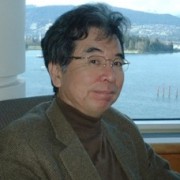I was born and raised in Japan. When I got to university, I became a pre- med student at the University of Tokyo. However, I changed my major to humanities, because I was attending university at the time of “student power” and I did not like the idea of following a path leading to promised authority and stability. After graduating from the Department of English Literature, I worked as a professional copywriter and subsequently as a teacher at a ‘cram school’ for several years. Then I decided to go back to university and to study medicine, since I had by then become ready to accept a career in medicine not as a symbol of authority, but as that of humanist.
After graduating from medical school, and with the support and encouragement of Professor Tsung-Yi Lin, who was a former WHO executive, I decided to go to the University of British Columbia in Vancouver, Canada, in 1985, to undertake postgraduate training in psychiatry.
At that time, I was one of the very few Japanese-speaking psychiatrists in Canada. Consequently, I received a lot of referrals from across Canada. During the last year of my residency training, I initiated a “Japanese Clinic” in the Cross-cultural Psychiatric Program at Vancouver General Hospital. There, I met many mental health professionals from diverse ethnic backgrounds. I also provided treatment for many patients with diverse ethnic backgrounds. This experience opened my eyes to transcultural psychiatry.
I returned to Japan in 1989 and started working in a big psychiatric institution. At the same time, I continued my connection with Vancouver, returning several times a year to see Japanese patients at the Cross-cultural Psychiatric Program.
In Japan, at that time, I was one of very few English-speaking psychiatrists.
I started to see English-speaking patients who had Japanese medical insurance. I also became a psychiatric consultant for the International Refugee Assistance Center in Tokyo, where I saw a lot of Vietnamese refugees. I continued to work there for more than ten years. Since that time, I have been one of the very few Japanese psychiatrists who are specialized in the mental health of refugees.
My major interests in psychiatry are cultural psychiatry and psychiatric rehabilitation. At the hospital where I was an attending psychiatrist, I was mainly involved in psychiatric rehabilitation. Japanese psychiatry is still largely hospital-based. However, I tried to reform the system of the hospital to become more community-based. I discharged a lot of long-stay patients and provided the support they needed from the hospital, so that they could continue to live with their families and participate in the life of their communities.
Outside the hospital, I focused my activity on cultural psychiatry.
In 1993, I established the Japanese Society of Transcultural Psychiatry (JSTP) with Japanese colleagues who were interested in transcultural psychiatry. Ever since, JSTP has been quite active in doing cultural research, holding academic meetings and helping ethnic minorities adapt to living in Japan.
As the Secretary of JSTP, I tried to establish collaborative links with international organizations in cultural psychiatry. In 2002, JSTP succeeded in holding, in Yokohama, a joint conference with the WPA Transcultural Psychiatry Section, just prior to the World Congress of Psychiatry in Japan. During the World Congress of Psychiatry in 2002, I was elected as Secretary of WPA-TPS.
In 1999, I became a professor of psychiatry at Taisho University in Tokyo. I am now teaching students who will become psychiatric social workers. I teach courses in Cultural Psychiatry and in Cross-cultural Social Work for these students.
From 2002 to 2005 I served as Secretary of WPA-TPS. At the TPS meeting in Cairo in Sep this year, during the World Congress of Psychiatry, I have been elected as Co-chair of the Section for the 2005-2008 term of office.
In the newly-founded World Association of Cultural Psychiatry, I have been invited to serve on WACP’s founding board of directors, and will contribute to the organization of the 1st World Congress of Cultural Psychiatry that is being held in Beijing in Sep 2006. In Japan, I currently serve as chair of the board of directors of JSTP and, in Canada, I am an adjunct professor in the Department of Psychiatry at the University of British Columbia.
April 5, 2006

